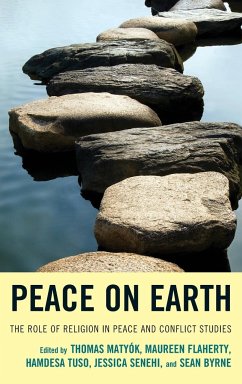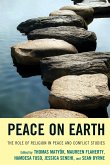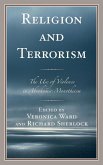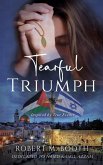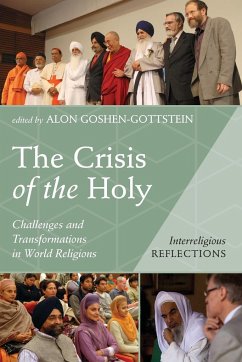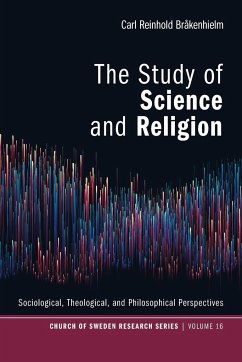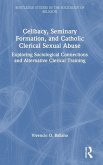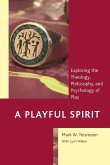Peace on Earth
Herausgeber: Matyók, Thomas; Tuso, Hamdesa; Flaherty, Maureen
Peace on Earth
Herausgeber: Matyók, Thomas; Tuso, Hamdesa; Flaherty, Maureen
- Gebundenes Buch
- Merkliste
- Auf die Merkliste
- Bewerten Bewerten
- Teilen
- Produkt teilen
- Produkterinnerung
- Produkterinnerung
Peace on Earth: The Role of Religion in Peace and Conflict Studies provides a critical analysis of faith and religious institutions in peacebuilding practice and pedagogy. The work captures the synergistic relationships among faith traditions and how multiple approaches to conflict transformation and peacebuilding result in a creative process that has the potential to achieve a more detailed view of peace on earth, containing breadth as well as depth. Library and bookstore shelves are filled with critiques of the negative impacts of religion in conflict scenarios. Peace on Earth: The Role of…mehr
Andere Kunden interessierten sich auch für
![Peace on Earth Peace on Earth]() Peace on Earth78,99 €
Peace on Earth78,99 €![Religion and Terrorism Religion and Terrorism]() Religion and Terrorism118,99 €
Religion and Terrorism118,99 €![Tearful Triumph Tearful Triumph]() Robert Marshall BoothTearful Triumph21,99 €
Robert Marshall BoothTearful Triumph21,99 €![The Crisis of the Holy The Crisis of the Holy]() The Crisis of the Holy21,99 €
The Crisis of the Holy21,99 €![The Study of Science and Religion The Study of Science and Religion]() Carl Reinhold BrakenhielmThe Study of Science and Religion36,99 €
Carl Reinhold BrakenhielmThe Study of Science and Religion36,99 €![Celibacy, Seminary Formation, and Catholic Clerical Sexual Abuse Celibacy, Seminary Formation, and Catholic Clerical Sexual Abuse]() Vivencio O. BallanoCelibacy, Seminary Formation, and Catholic Clerical Sexual Abuse180,99 €
Vivencio O. BallanoCelibacy, Seminary Formation, and Catholic Clerical Sexual Abuse180,99 €![A Playful Spirit A Playful Spirit]() Mark W. TeismannA Playful Spirit44,99 €
Mark W. TeismannA Playful Spirit44,99 €-
-
-
Peace on Earth: The Role of Religion in Peace and Conflict Studies provides a critical analysis of faith and religious institutions in peacebuilding practice and pedagogy. The work captures the synergistic relationships among faith traditions and how multiple approaches to conflict transformation and peacebuilding result in a creative process that has the potential to achieve a more detailed view of peace on earth, containing breadth as well as depth. Library and bookstore shelves are filled with critiques of the negative impacts of religion in conflict scenarios. Peace on Earth: The Role of Religion in Peace and Conflict Studies offers an alternate view that suggests religious organizations play a more complex role in conflict than a simply negative one. Faith-based organizations, and their workers, are often found on the frontlines of conflict throughout the world, conducting conflict management and resolution activities as well as advancing peacebuilding initiatives.
Produktdetails
- Produktdetails
- Verlag: Lexington Books
- Seitenzahl: 454
- Erscheinungstermin: 16. Dezember 2013
- Englisch
- Abmessung: 235mm x 157mm x 31mm
- Gewicht: 883g
- ISBN-13: 9780739176283
- ISBN-10: 0739176285
- Artikelnr.: 39358955
- Herstellerkennzeichnung
- Libri GmbH
- Europaallee 1
- 36244 Bad Hersfeld
- gpsr@libri.de
- Verlag: Lexington Books
- Seitenzahl: 454
- Erscheinungstermin: 16. Dezember 2013
- Englisch
- Abmessung: 235mm x 157mm x 31mm
- Gewicht: 883g
- ISBN-13: 9780739176283
- ISBN-10: 0739176285
- Artikelnr.: 39358955
- Herstellerkennzeichnung
- Libri GmbH
- Europaallee 1
- 36244 Bad Hersfeld
- gpsr@libri.de
Thomas Matyók is associate professor in the Program in Conflict and Peace Studies at the University of North Carolina at Greensboro. He is a co-editor of Critical Issues in Peace and Conflict Studies: Theory, Practice, and Pedagogy. Maureen Flaherty is assistant professor in peace and conflict studies at the Arthur V. Mauro Centre for Peace and Justice, St. Paul's College, University of Manitoba. She is the author of Peacebuilding with Women in Ukraine: Using Narrative to Envision a Common Future. Hamdesa Tuso is a faculty member at the Department of Peace and Conflict Studies of the University of Manitoba. He is the founder of the Oromo Studies Association, and founder and director of the Africa Working Group. Jessica Senehi is associate professor of peace and conflict studies, and associate director of the Arthur V. Mauro Centre for Peace and Justice, St. Paul's College at University of Manitoba. She co-authored with Sean Byrne, Violence: Analysis, Intervention, and Prevention, and coedited the Handbook of Conflict Analysis and Resolution. Sean Byrne is professor of peace and conflict studies, and founding head of the Ph.D. and joint MA programs in peace and conflict studies at University of Manitoba, and founding director of the Arthur V. Mauro Centre for Peace and Justice housed in St. Paul's College at the University of Manitoba. He is author, co-author, and co-editor of numerous books, journal articles and book chapters.
Chapter One: Can People of Faith, and People in Peace and Conflict Studies,
Work Together? Thomas Matyók and Maureen Flaherty Part I: Peace and
Conflict Studies in a Contextualized Place Chapter Two: Religion, Peace and
Violence: Tensions and Promises David Creamer and Christopher Hrynkow
Chapter Three: Ahimsa: A World without Violence? Klaus Klostermaier Chapter
Four Blessing-Based Love (Agape) As a Heuristic to Understanding Effective
Reconciliation Practices: A Reading of I Corinthians 13 In a Peacebuilding
Context Vern Neufeld Redekop Part II: Religions and Peace and Conflict
Studies Chapter Five: Catholic Peacemaking: A History and Analysis with
Special Emphasis on the Work of the Community of Sant 'Egidio John Perry
Chapter Six: Evangelical Women and Transformative Peacebuilding Kristen
Lundquist, Hien Vu, and Chris Seiple Chapter Seven: Judaism and the Path to
Peace Michael Lerner Chapter Eight: Islam and Peace and Conflict Studies
Nathan Funk Chapter Nine: The Role of Indigenous African Religion in
Peacemaking Hamdesa Tuso Chapter Ten: Aboriginal Peoples' in Canada and the
Role of Religion in Conflict: The Ever Elusive Peace Paul Nicolas Cormier
Chapter Eleven: Mennonite International Peacebuilding and Local Ownership
Chuck Thiessen Chapter Twelve: Let Us See What Love Can Do: Quaker
Contributions to Peacebuilding and Conflict Transformation Vernie Davis
Chapter Thirteen: Haïtian Vodou: Peace Begins Within Margret Mitchell
Armand Chapter Fourteen: Eastern Orthodox Christianity: Provocations and
Challenges for a Just Peace in an Era of Conflict and Global Transition
Harry Anastasiou Chapter Fifteen: Ancient News from Buddha's Research Lab:
the Role of Buddhism in Peace and Conflict Settings Katharina Bitzker
Chapter Sixteen: Hinduism: War, Peace, and Peace and Conflict Studies S. I.
Keethaponcalan Chapter Seventeen: Daoist Harmony as a Chinese Worldview
Yueh-Ting Lee, Honggang Yang, and Min Wang Chapter Eighteen: Humanity's
Coming of Age: A Bahá'í View of the Process toward World Peace Charles
Egerton Chapter Nineteen: Religious Leader Engagement: Military Chaplains
Engaging Indigenous Religious Leaders and Their Communities in Operations
(Voices from the International Chaplaincy Community) S. K. Moore Part III:
The Way Forward: Four Faith Models Chapter Twenty: Striving for Justice and
Peace on Earth, Catholic Peace Initiatives Ismael Muvingi Chapter
Twenty-One: Peacebuilding Principles and Values in Islam: Beyond the Basic
Framework Mohammed Abu-Nimer Chapter Twenty-Two: Peace on Earth: The
Anabaptist-Mennonite Perspective Lois Edmund Chapter Twenty-Three: Neve
Shalom/Wahat al-Salam: the 'Oasis of Peace' Deanna Armbruster Chapter
Twenty-Four: Conclusions: Peace on Earth Revisited Hamdesa Tuso, Jessica
Senehi, and Sean Byrne
Work Together? Thomas Matyók and Maureen Flaherty Part I: Peace and
Conflict Studies in a Contextualized Place Chapter Two: Religion, Peace and
Violence: Tensions and Promises David Creamer and Christopher Hrynkow
Chapter Three: Ahimsa: A World without Violence? Klaus Klostermaier Chapter
Four Blessing-Based Love (Agape) As a Heuristic to Understanding Effective
Reconciliation Practices: A Reading of I Corinthians 13 In a Peacebuilding
Context Vern Neufeld Redekop Part II: Religions and Peace and Conflict
Studies Chapter Five: Catholic Peacemaking: A History and Analysis with
Special Emphasis on the Work of the Community of Sant 'Egidio John Perry
Chapter Six: Evangelical Women and Transformative Peacebuilding Kristen
Lundquist, Hien Vu, and Chris Seiple Chapter Seven: Judaism and the Path to
Peace Michael Lerner Chapter Eight: Islam and Peace and Conflict Studies
Nathan Funk Chapter Nine: The Role of Indigenous African Religion in
Peacemaking Hamdesa Tuso Chapter Ten: Aboriginal Peoples' in Canada and the
Role of Religion in Conflict: The Ever Elusive Peace Paul Nicolas Cormier
Chapter Eleven: Mennonite International Peacebuilding and Local Ownership
Chuck Thiessen Chapter Twelve: Let Us See What Love Can Do: Quaker
Contributions to Peacebuilding and Conflict Transformation Vernie Davis
Chapter Thirteen: Haïtian Vodou: Peace Begins Within Margret Mitchell
Armand Chapter Fourteen: Eastern Orthodox Christianity: Provocations and
Challenges for a Just Peace in an Era of Conflict and Global Transition
Harry Anastasiou Chapter Fifteen: Ancient News from Buddha's Research Lab:
the Role of Buddhism in Peace and Conflict Settings Katharina Bitzker
Chapter Sixteen: Hinduism: War, Peace, and Peace and Conflict Studies S. I.
Keethaponcalan Chapter Seventeen: Daoist Harmony as a Chinese Worldview
Yueh-Ting Lee, Honggang Yang, and Min Wang Chapter Eighteen: Humanity's
Coming of Age: A Bahá'í View of the Process toward World Peace Charles
Egerton Chapter Nineteen: Religious Leader Engagement: Military Chaplains
Engaging Indigenous Religious Leaders and Their Communities in Operations
(Voices from the International Chaplaincy Community) S. K. Moore Part III:
The Way Forward: Four Faith Models Chapter Twenty: Striving for Justice and
Peace on Earth, Catholic Peace Initiatives Ismael Muvingi Chapter
Twenty-One: Peacebuilding Principles and Values in Islam: Beyond the Basic
Framework Mohammed Abu-Nimer Chapter Twenty-Two: Peace on Earth: The
Anabaptist-Mennonite Perspective Lois Edmund Chapter Twenty-Three: Neve
Shalom/Wahat al-Salam: the 'Oasis of Peace' Deanna Armbruster Chapter
Twenty-Four: Conclusions: Peace on Earth Revisited Hamdesa Tuso, Jessica
Senehi, and Sean Byrne
Chapter One: Can People of Faith, and People in Peace and Conflict Studies,
Work Together? Thomas Matyók and Maureen Flaherty Part I: Peace and
Conflict Studies in a Contextualized Place Chapter Two: Religion, Peace and
Violence: Tensions and Promises David Creamer and Christopher Hrynkow
Chapter Three: Ahimsa: A World without Violence? Klaus Klostermaier Chapter
Four Blessing-Based Love (Agape) As a Heuristic to Understanding Effective
Reconciliation Practices: A Reading of I Corinthians 13 In a Peacebuilding
Context Vern Neufeld Redekop Part II: Religions and Peace and Conflict
Studies Chapter Five: Catholic Peacemaking: A History and Analysis with
Special Emphasis on the Work of the Community of Sant 'Egidio John Perry
Chapter Six: Evangelical Women and Transformative Peacebuilding Kristen
Lundquist, Hien Vu, and Chris Seiple Chapter Seven: Judaism and the Path to
Peace Michael Lerner Chapter Eight: Islam and Peace and Conflict Studies
Nathan Funk Chapter Nine: The Role of Indigenous African Religion in
Peacemaking Hamdesa Tuso Chapter Ten: Aboriginal Peoples' in Canada and the
Role of Religion in Conflict: The Ever Elusive Peace Paul Nicolas Cormier
Chapter Eleven: Mennonite International Peacebuilding and Local Ownership
Chuck Thiessen Chapter Twelve: Let Us See What Love Can Do: Quaker
Contributions to Peacebuilding and Conflict Transformation Vernie Davis
Chapter Thirteen: Haïtian Vodou: Peace Begins Within Margret Mitchell
Armand Chapter Fourteen: Eastern Orthodox Christianity: Provocations and
Challenges for a Just Peace in an Era of Conflict and Global Transition
Harry Anastasiou Chapter Fifteen: Ancient News from Buddha's Research Lab:
the Role of Buddhism in Peace and Conflict Settings Katharina Bitzker
Chapter Sixteen: Hinduism: War, Peace, and Peace and Conflict Studies S. I.
Keethaponcalan Chapter Seventeen: Daoist Harmony as a Chinese Worldview
Yueh-Ting Lee, Honggang Yang, and Min Wang Chapter Eighteen: Humanity's
Coming of Age: A Bahá'í View of the Process toward World Peace Charles
Egerton Chapter Nineteen: Religious Leader Engagement: Military Chaplains
Engaging Indigenous Religious Leaders and Their Communities in Operations
(Voices from the International Chaplaincy Community) S. K. Moore Part III:
The Way Forward: Four Faith Models Chapter Twenty: Striving for Justice and
Peace on Earth, Catholic Peace Initiatives Ismael Muvingi Chapter
Twenty-One: Peacebuilding Principles and Values in Islam: Beyond the Basic
Framework Mohammed Abu-Nimer Chapter Twenty-Two: Peace on Earth: The
Anabaptist-Mennonite Perspective Lois Edmund Chapter Twenty-Three: Neve
Shalom/Wahat al-Salam: the 'Oasis of Peace' Deanna Armbruster Chapter
Twenty-Four: Conclusions: Peace on Earth Revisited Hamdesa Tuso, Jessica
Senehi, and Sean Byrne
Work Together? Thomas Matyók and Maureen Flaherty Part I: Peace and
Conflict Studies in a Contextualized Place Chapter Two: Religion, Peace and
Violence: Tensions and Promises David Creamer and Christopher Hrynkow
Chapter Three: Ahimsa: A World without Violence? Klaus Klostermaier Chapter
Four Blessing-Based Love (Agape) As a Heuristic to Understanding Effective
Reconciliation Practices: A Reading of I Corinthians 13 In a Peacebuilding
Context Vern Neufeld Redekop Part II: Religions and Peace and Conflict
Studies Chapter Five: Catholic Peacemaking: A History and Analysis with
Special Emphasis on the Work of the Community of Sant 'Egidio John Perry
Chapter Six: Evangelical Women and Transformative Peacebuilding Kristen
Lundquist, Hien Vu, and Chris Seiple Chapter Seven: Judaism and the Path to
Peace Michael Lerner Chapter Eight: Islam and Peace and Conflict Studies
Nathan Funk Chapter Nine: The Role of Indigenous African Religion in
Peacemaking Hamdesa Tuso Chapter Ten: Aboriginal Peoples' in Canada and the
Role of Religion in Conflict: The Ever Elusive Peace Paul Nicolas Cormier
Chapter Eleven: Mennonite International Peacebuilding and Local Ownership
Chuck Thiessen Chapter Twelve: Let Us See What Love Can Do: Quaker
Contributions to Peacebuilding and Conflict Transformation Vernie Davis
Chapter Thirteen: Haïtian Vodou: Peace Begins Within Margret Mitchell
Armand Chapter Fourteen: Eastern Orthodox Christianity: Provocations and
Challenges for a Just Peace in an Era of Conflict and Global Transition
Harry Anastasiou Chapter Fifteen: Ancient News from Buddha's Research Lab:
the Role of Buddhism in Peace and Conflict Settings Katharina Bitzker
Chapter Sixteen: Hinduism: War, Peace, and Peace and Conflict Studies S. I.
Keethaponcalan Chapter Seventeen: Daoist Harmony as a Chinese Worldview
Yueh-Ting Lee, Honggang Yang, and Min Wang Chapter Eighteen: Humanity's
Coming of Age: A Bahá'í View of the Process toward World Peace Charles
Egerton Chapter Nineteen: Religious Leader Engagement: Military Chaplains
Engaging Indigenous Religious Leaders and Their Communities in Operations
(Voices from the International Chaplaincy Community) S. K. Moore Part III:
The Way Forward: Four Faith Models Chapter Twenty: Striving for Justice and
Peace on Earth, Catholic Peace Initiatives Ismael Muvingi Chapter
Twenty-One: Peacebuilding Principles and Values in Islam: Beyond the Basic
Framework Mohammed Abu-Nimer Chapter Twenty-Two: Peace on Earth: The
Anabaptist-Mennonite Perspective Lois Edmund Chapter Twenty-Three: Neve
Shalom/Wahat al-Salam: the 'Oasis of Peace' Deanna Armbruster Chapter
Twenty-Four: Conclusions: Peace on Earth Revisited Hamdesa Tuso, Jessica
Senehi, and Sean Byrne

